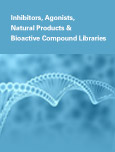Request The Product List ofBMI-1
BMI-1
Polycomb complex protein BMI-1 (also known as PCGF4 or RNF51) is a protein that in humans is encoded by the BMI1 gene (B cell-specific Moloney murine leukemia virus integration site 1), a polycomb ring finger oncogene. BMI1 has been reported as an oncogene by regulating p16 and p19, which are cell cycle inhibitor genes.
BMI-1 interacts with several signaling containing Wnt, Akt, Notch, Hedgehog and receptor tyrosine kinase (RTK) pathway. In Ewing sarcoma family of tumors (ESFT), the knockdown of BMI-1 gene would greatly influence the Notch and Wnt signaling pathway which are important for ESFT formation and development. BMI-1 also mediates the effect of Hedgehog signaling pathway on mammary stem cell proliferation, and modulation of Bmi-1 expression in mammosphere-initiating cells alters mammary development in a humanized nonobese diabetic-severe combined immunodeficient mouse model. BMI-1 prevents stem cell aging, at least partly, by blocking expression of the cyclin-dependent kinase inhibitor p16(Ink4a), dysregulation of the Bmi-1/p16(Ink4a) pathway provokes an aging-associated decline of submandibular gland function.
BMI-1 inhibitor PTC596 downregulates MCL-1 and induces p53-independent mitochondrial apoptosis in acute myeloid leukemia progenitor cells, PTC-209 also exhibits synergistic and additive anti-myeloma activity when combined with other epigenetic inhibitors targeting EZH2 and BET bromodomains.
References:
1. Douglas D, et al. BMI-1 promotes ewing sarcoma tumorigenicity independent of CDKN2A repression. Cancer Res. 2008 Aug 15;68(16):6507-15.
2. Liu S, et al. Hedgehog signaling and Bmi-1 regulate self-renewal of normal and malignant human mammary stem cells. Cancer Res. 2006 Jun 15;66(12):6063-71.
3. Yamakoshi K, et al. Dysregulation of the Bmi-1/p16(Ink⁴a) pathway provokes an aging-associated decline of submandibular gland function. Aging Cell. 2015 Aug;14(4):616-24.
4. Nishida Y, et al. The novel BMI-1 inhibitor PTC596 downregulates MCL-1 and induces p53-independent mitochondrial apoptosis in acute myeloid leukemia progenitor cells. Blood Cancer J. 2017 Feb 17;7(2):e527.
5. Alzrigat M, et al. The polycomb group protein BMI-1 inhibitor PTC-209 is a potent anti-myeloma agent alone or in combination with epigenetic inhibitors targeting EZH2 and the BET bromodomains. Oncotarget. 2017 Oct 20;8(61):103731-103743.













